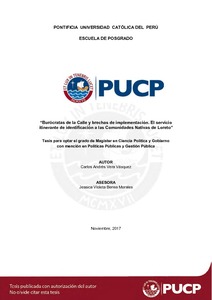| dc.contributor.advisor | Bensa Morales, Jessica Violeta | |
| dc.contributor.author | Vera Vásquez, Carlos Andrés | es_ES |
| dc.date.accessioned | 2018-01-19T22:27:54Z | es_ES |
| dc.date.available | 2018-01-19T22:27:54Z | es_ES |
| dc.date.created | 2017 | es_ES |
| dc.date.issued | 2018-01-19 | es_ES |
| dc.identifier.uri | http://hdl.handle.net/20.500.12404/9908 | |
| dc.description.abstract | El servicio de identificación y documentación brindado a las comunidades nativas de la Amazonía peruana ha incorporado en los últimos diez años la oferta móvil como una estrategia para facilitar el acceso de estos ciudadanos a su documento de identidad. Frente a las distancias entre el diseño y la implementación de la política que guía el referido servicio, los burócratas de la calle (registradores) se ven desafiados a desarrollar diversas estrategias para alcanzar el propósito de ésta política. El objetivo de la investigación es comprender la contribución de las estrategias desarrolladas por los registradores itinerantes para garantizar el derecho a la identidad de los miembros de las comunidades nativas de Loreto durante el 2015-2016. A partir del análisis retrospectivo como método cualitativo, se identifica la brecha existente entre el diseño y la implementación de la política de identificación y documentación. Esta brecha limita la posibilidad de recuperar las estrategias desarrolladas a partir de la discrecionalidad que ejercen los burócratas de la calle. Por ejemplo, las redes informales de alianzas estratégicas para hacer efectivo este servicio, la pertinencia cultural para relacionarse con la ciudadanía, así como la gestión de los problemas operacionales que surgen. De esta manera, se explica que el nivel de influencia que ellos ejercen sobre la ciudadanía es determinante para la implementación de la política, ocupando muchas veces un rol de fixers, dispuestos a intervenir ahí donde ocurre algún percance que pueda afectar los resultados y sentido que se persiguen, generando así una tipología de gestión en función a los problemas enfrentados. El valor de las estrategias sorteadas por los burócratas de la calle permite evidenciar la necesidad de corregir falencias en el diseño de la política que salen a la luz en el proceso de implementación, particularmente cuando ésta se aplica en contextos culturalmente diversos. | es_ES |
| dc.description.abstract | The identification and documentation service provided to the native communities of the Peruvian Amazon has incorporated the mobile offer in the last ten years as a strategy to facilitate the access of these citizens to their identity document. Due to de
differences between the design and the implementation of this service, street
bureaucrats (registrars) are challenged to develop various strategies to achieve the
purpose of this policy. The intention of this research is to understand the contribution of the strategies developed by the itinerant registrars to guarantee the right to identity of the members of the native communities of Loreto during 2015-2016. Based on a
qualitative “backward mapping”, a gap between the design and implementation of the
policy is identified. This gap limits the possibility of recovering the strategies developed by street bureaucrats that own great discretionary powers. For example, the informal networks of strategic alliances to make this service effective, the cultural relevance for the relationship with the citizenship, as well as the management of the operational problems that arise in the field. In this way, it is explained that the level of influence they exert on the citizenship is vital for the implementation of the policy, often assuming a role of fixers, willing to intervene where a mishap occurs that may affect the results and meaning that are pursued, thus devolving a management typology according to the faced problems. The value of the strategies implemented by street bureaucrats makes possible to highlight the need to correct flaws that become evident in the implementation process, particularly when it is applied in cultural diverse contexts. | es_ES |
| dc.language.iso | spa | es_ES |
| dc.publisher | Pontificia Universidad Católica del Perú | es_ES |
| dc.rights | info:eu-repo/semantics/openAccess | es_ES |
| dc.rights.uri | http://creativecommons.org/licenses/by-nc-nd/2.5/pe/ | * |
| dc.subject | Pueblos indígenas--Identificación--Perú--Loreto | es_ES |
| dc.subject | Pueblos indígenas--Política gubernamental--Perú | es_ES |
| dc.subject | Funcionarios públicos--Perú--Loreto | es_ES |
| dc.subject | Planificación política--Perú | es_ES |
| dc.title | Burócratas de la Calle y brechas de implementación. El servicio itinerante de identificación a las comunidades nativas de Loreto | es_ES |
| dc.type | info:eu-repo/semantics/masterThesis | es_ES |
| thesis.degree.name | Magíster en Ciencia Política y Gobierno con mención en Políticas Públicas y Gestión Pública | es_ES |
| thesis.degree.level | Maestría | es_ES |
| thesis.degree.grantor | Pontificia Universidad Católica del Perú. Escuela de Posgrado | es_ES |
| thesis.degree.discipline | Ciencia Política y Gobierno con mención en Políticas Públicas y Gestión Pública | es_ES |
| renati.advisor.dni | 07264881 | |
| renati.advisor.orcid | https://orcid.org/0000-0002-6808-3637 | es_ES |
| renati.discipline | 312167 | es_ES |
| renati.level | https://purl.org/pe-repo/renati/level#maestro | es_ES |
| renati.type | http://purl.org/pe-repo/renati/type#tesis | es_ES |
| dc.publisher.country | PE | es_ES |
| dc.subject.ocde | https://purl.org/pe-repo/ocde/ford#5.06.00 | es_ES |






